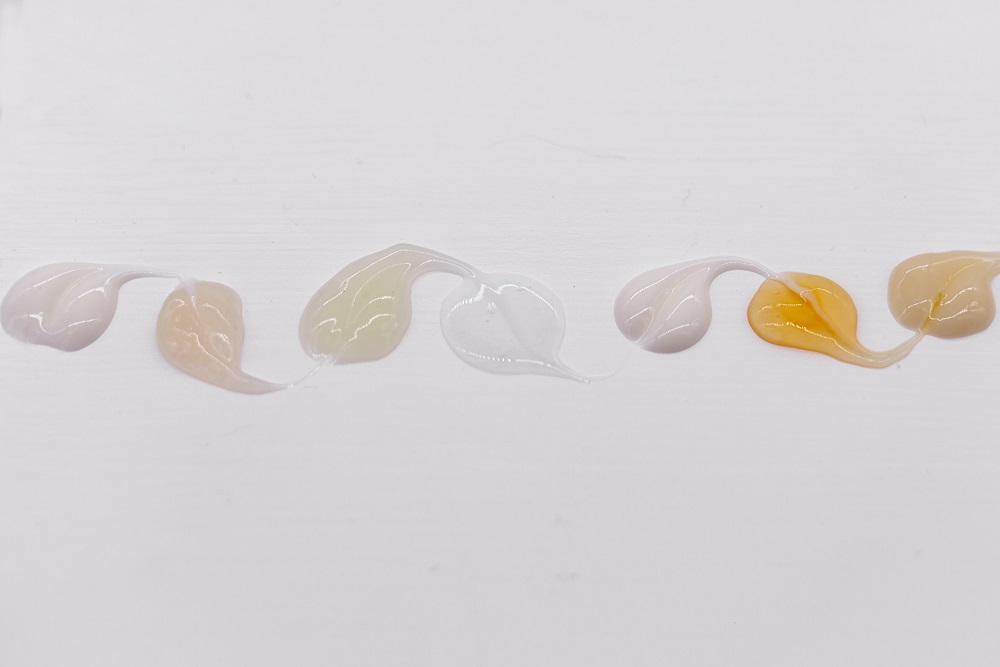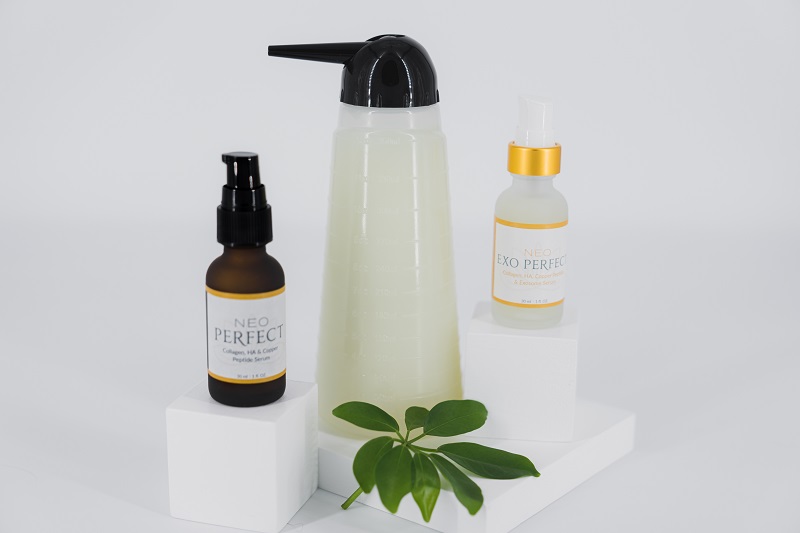what is
COLLAGEN?
The most abundant structural protein in humans (and animals), collagen is a key protein comprising the structure and framework of cells and tissues in the body. Found in connective tissue, skin, tendons, bones, and cartilage, it provides structural support to tissues and plays important roles in cellular processes, including tissue repair, immune response, cellular communication, and cellular migration. While there are over 16 types of collagen in the body, over 90% of those proteins are classified as Type 1, found in the skin, tendons, and bones. Collagen is composed mainly of the amino acids glycine, proline, and hydroxyproline and is found in the extracellular matrix (ECM), an intricate network of macromolecules that determines the physical properties of body tissues. In the dermis, collagen helps form a fibrous network of cells called fibroblasts, which promote new cell formation. It also plays a role in replacing and restoring dead skin cells. As people grow older, their collagen becomes fragmented, fibroblast function becomes impaired, and collagen production slows. These changes, along with the loss of another key structural protein called elastin, lead to signs of aging such as sagging skin and wrinkles.
what is
COLLAGEN?
The most abundant structural protein in humans (and animals), collagen is a key protein comprising the structure and framework of cells and tissues in the body. Found in connective tissue, skin, tendons, bones, and cartilage, it provides structural support to tissues and plays important roles in cellular processes, including tissue repair, immune response, cellular communication, and cellular migration. While there are over 16 types of collagen in the body, over 90% of those proteins are classified as Type 1, found in the skin, tendons, and bones. Collagen is composed mainly of the amino acids glycine, proline, and hydroxyproline and is found in the extracellular matrix (ECM), an intricate network of macromolecules that determines the physical properties of body tissues. In the dermis, collagen helps form a fibrous network of cells called fibroblasts, which promote new cell formation. It also plays a role in replacing and restoring dead skin cells. As people grow older, their collagen becomes fragmented, fibroblast function becomes impaired, and collagen production slows. These changes, along with the loss of another key structural protein called elastin, lead to signs of aging such as sagging skin and wrinkles.

why is it used, and how can it help?
Collagen is resorbable. This means it can be broken down, converted, and absorbed back into the body. For this reason, collagen is used for a multitude of applications within the cosmetic world from treating wrinkles and fine lines, to skin rejuvenation, and wound care, to name a few.
The quality and type of collagen used in cosmetics is of utmost importance. NEO Naturals uses medical-grade high molecular weight organic type 1 bovine collagen from a closed herd out of California – the only collagen approved for safe application beneath the skin.

why is it used, and how can it help?
Collagen is resorbable. This means it can be broken down, converted, and absorbed back into the body. For this reason, collagen is used for a multitude of applications within the cosmetic world from treating wrinkles and fine lines, to skin rejuvenation, and wound care, to name a few.
The quality and type of collagen used in cosmetics is of utmost importance. NEO Naturals uses medical-grade high molecular weight organic type 1 bovine collagen from a closed herd out of California – the only collagen approved for safe application beneath the skin.
What Neo
Natural Products Contain Collagen?
NEO Perfect™ is a neutral, high molecular weight serum with the highest concentration of pharmaceutical-grade organic bovine collagen on the market – the only collagen approved as safe for subcutaneous application. Infused with hyaluronic acid and copper peptide (GHK-Cu).
NEO Exo Perfect™ is a combination of our high quality molecular weight collagen infused with copper peptides and hyaluronic acid with the addition of exosomes to create a serum possessing incredible regenerative benefits for aging or damaged skin.

What Neo
Natural Products Contain Collagen?
NEO Perfect™ is a neutral, high molecular weight serum with the highest concentration of pharmaceutical-grade organic bovine collagen on the market – the only collagen approved as safe for subcutaneous application. Infused with hyaluronic acid and copper peptide (GHK-Cu),
NEO Exo Perfect™ is a combination of our high quality molecular weight collagen infused with copper peptides and hyaluronic acid with the addition of exosomes to create a serum possessing incredible regenerative benefits for aging or damaged skin.
NEO Exo Perfect™ is a combination of our high quality molecular weight collagen infused with copper peptides and hyaluronic acid with the addition of exosomes to create a serum possessing incredible regenerative benefits for aging or damaged skin.
